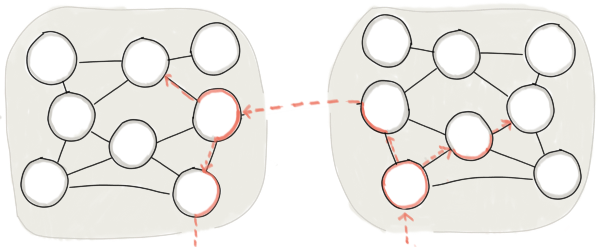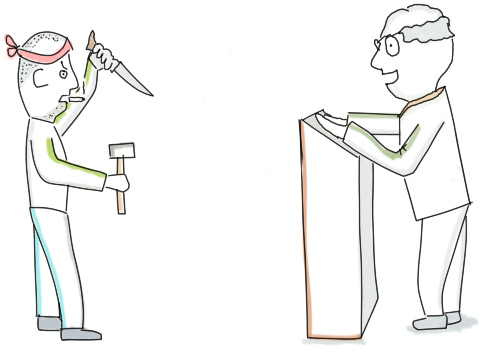Let me introduce two characters, Bill and Chuck. To be honest, they are personae distilled from people you could meet. They are especially interesting because of their behavior: Instead of collaborating to let ideas compete they fight to get their ideas into the market. And sadly, they have good reasons to do so.

It is probably a basic truth that innovative products are not the makings of one brain, even though one or several brains may admittedly have had more impact than others. Seen in that light, you should really get to know Bill and Chuck – unless you know them already?
Bill, the “professor”
Bill’s a great chap and I really had many insightful chats with him. However, in meetings, Bill shows an interesting behavioral pattern: he starts lecturing. Well-founded, conclusive argumentation and exactly no help at all to the topic at hand. His lecture is unstoppable, at least using any socially acceptable counter-measures.
I moderated workshops with Bill as a participant. Such workshops followed an ever re-occuring pattern: After some warming up, people start to exchange thoughts and their brains begin to connect. The group moves to the important topics. Then Bill’s lecture hits. It first just interrupts. Then it goes on and on, is utterly right and completely irrelevant. The group is dazed and sidetracked, the brains disconnect. Bill not only makes the group loose fifteen minutes of workshop time, he also kills off all group dynamics.
Bill does not mean evil. He just seems to act in this peculiar way. Once we’ve build a good relationship, I was able to cut Bill short by being rude in a very polite way. This however just cut the fifteen minutes down to one, group dynamics were still broken.
Chuck, the “warlord”
Introducing Chuck. Looking back I can acknowledge his broad abilities. However when working with him you get stabbed twice a minute. He says things like “You guys always do it [some old story or prejudice putting you in a bad light]”. Another good one is: “We cannot run the discussion this way, we should do [something completely different].” And then after whatever discussion you wanted to have has been completely killed off he would come up with something like “and I really think it would be your job to bring some structure into the discussion.”
Chuck usually cuts short any healthy group dynamics by attacking participants on a personal level.
Surprisingly it seemed to me that Chuck does not want to behave like this. I once cut him short quite bluntly by mentioning how many minutes of everybody’s time we just wasted so far and asking whether we want to continue wasting or doing something useful. Not only did this stop Chuck, we also had discussion later about his behavior.
Super-brains required
The point is: Bill and Chuck both have a communication pattern that disqualifies them for group work.
That may need some explanation: Our brain has a very peculiar way of operating. Unlike a computer program that strictly works through a set of instructions, our thoughts trigger associations that launch new thoughts and yet other associations and so on. In this inspirational thinking we recombine and apply bits and pieces from a huge amount of knowledge to the situation at hand and this makes us creative and effective problem solvers.

When several persons combine their thoughts, a super brain can form. The things said or done by one person inspire thoughts and associations in other persons, making them perform some action that inspires yet other thoughts in yet other persons. This with an ever increasing speed until the stream of thoughts runs the group rather than the group runs the thoughts. Such a super brain in full flow allows for a new level of creative power as different talents and knowledge combine.
For this super-brain to work a few things are needed, especially:
- some kind of equality amongst the participants
- a common goal the participants want to achieve together
- respect for the others’ talents and opinions
- readiness to not only to download but also to listen, to adopt other points, to follow up, ro recombine and to contribute.
So back to Bill and Chuck. Bill and Chuck do not strive to achieve a common goal and are not willing to work with others. Their intent is to make everybody else align to their goals. However they lack hiearchical power and thus must find another way so they create inequality between themselves and the others. Bill by his lecturing heightens himself above the group. In consequence of his wisdom every one in the room should see that Bill Must Be Right and the group can just accept Bills proposals without further discussion. Chuck does just the opposite, he lowers the others by personally attacking them and pushing them face down into the dirt.
The effect: no super brain can form and the group remains ineffective.
How to create Chucks and Bills
Both Bill’s and Chuck’s behavior are seemingly unwanted. Still they apply this pattern on a regular basis, it became at least a very bad habit. There are some interesting circumstances in the environments Bill and Chuck work that seem to foster this behavior:
- Individual monetary incentives based on personal success and standing within the company: Basically, the more ideas Chuck or Bill deliver to the market and the bigger the impact, the more they get rewarded within the company.
- Competitive environment setup by the top management: the best ideas should compete against each other.
- Knowledge about customers and users randomly disseminates within the company leaving everybody with different bits and pieces of the real world outside. So there is no common frame to evaluate and discuss ideas.

These ingredients form a dangerous brew:
- Highway to personal success: push own ideas on the market.
- Obstacle: Others who should collaborate have potent ideas of their own resulting in a myriad of conflicts of interest.
- Snag One: No common evaluation frame for ideas, as every argument from a market perception can and will be quickly countered with an argument stemming from another perception. Thus conflicts between ideas cannot be resolved through objective selection of the best ideas.
- Snag Two: Negotiation along the way “you support my idea now and I support your idea tomorrow” seems not feasible, given the amount of people to negotiate with.
- Snag Three: Upper management fosters competition and decisions are valid only until a better idea or further insights come along. In consequence, hierarchical decisions are largely ignored.
- Snag Four: Bill and Chuck have not enough standing or power on their own so others would follow them.
- Resulting behavior: See Bill and Chuck.
Other characters you might meet
Still, some people in Bill and Chucks companies have better chances to get their ideas onto the market.
One person I met was a product manager, lets call him Harry. By pushing down other ideas and opinion by excerting his power as product manager, he would get his product onto the market. When having Harry in a creativity workshop, he would simply stomp any novel idea with statements like “tried this, didn’t work”, or “the market doesn’t want it”.
Another person was an inventor. As many people and also some key decider in the company regarded him as a modern Edison, his ideas had higher priorities than others. So the inventor’s reputation makes his ideas more valuable than those from others.
You can also find the occasional tyrant, lets call him Donald, who just exerts his hierarchical power to full extent. Having the tyrant in the workshop will make all the underlings turn their heads to anticipate what his or her majesties position will be. Not having the tyrant in the workshop will result basically in decisions the tyrant overrules afterwards, if decisions can be made at all.
Ideas should compete – not people
It’s probably a good strategy to have many competing ideas and let the best of them hit the market. Therefore, create room for exploration so great ideas emerge and turn them into successful innovations.
However keep in mind that people tend to identify themselves with their ideas and thus while ideas compete for resources also the people start competing to some degree. This can go completely awry as in Bill’s and Chuck’s companies. Here, rather than competing ideas, people fight for more power over their peers so their ideas make it onto the market.
A few things one should do come to my mind:
- Market intelligence: Have a generally accepted way of how to evaluate ideas. Establishing costs is usually relatively easy, establishing the value of an idea is however tough and in most companies just guesswork. The more people accept the way you do this, the better. The more you can rely on user and customer feedback to the ideas, the better.
- Detach Individuals from ideas: No individual reward for having great ideas. Rather foster a culture where people postpone or even bury an idea because they can participate with a better idea. Make people collaborate from the beginning so that ideas do not belong to one person only.
How is this happening in your company today? How should it be tomorrow?